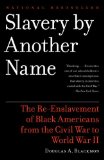Summary | Excerpt | Reviews | Readalikes | Genres & Themes | Author Bio
The Re-Enslavement of Black Americans from the Civil War to World War II

Critics' Opinion:
Readers' Opinion:
First Published:
Mar 2008, 480 pages
Paperback:
Jan 2009, 496 pages
Long generations hence, descendants of slaves from the plantation still recounted a vague legend of the generosity of a Cottingham master— giving permission to marry to a favored mulatto named Green. That slave, who would remain at Elisha’s side past emancipation and until the old master’s death, would become the namesake of Henry and Mary’s youngest son.
But even as Elisha had allowed a strain of tenderness to co-reside with the brutally circumscribed lives of his slaves, he never lost sight of their fundamental definition—as cattle. They were creatures bought or bred for the production of wealth. Even as he deeded to daughter Rebecca the slave Frances, Elisha was careful to enumerate in the document the recognition that he was giving up not just one slave girl, but a whole line of future stock who might have brought him cash or labor. Along with Frances, Elisha was careful to specify, his newlywed daughter received all “future increase of the girl.”
The marriage of Henry, now twenty years old, and Mary, one year his junior, in 1868 was the first among Cottingham people, black or white, in two seasons. Another slave, Albert, had wed, and left for good in the middle of the first picking time after the destruction of the war—amid the chaos and uncertainty when no one could be sure slavery had truly ended.7 Albert didn’t wait to find out.
Now, two years later, the coming marriage surely warmed Elisha at some level. But as Henry prepared to take a wife and become a man of this peculiar new era, everything the old white man had forged—everything on which that gift to his daughter twenty years before had been predicated—hung in the fragile limbo of a transformed social order. Whatever satisfaction the filial ties gave the white master at the wedding of his former bondsman would have been tempered by the poverty and grief that had overwhelmed him.
Most of Elisha’s slaves remained nearby. Some still worked his property, for wages or a share of the cotton crop. But the end of the war had left the white Cottinghams at a point of near desolation. The hard winter threatened to bring them to their knees.
As Henry and Mary’s wedding approached in 1868, whites across the South strained to accept the apparently inevitable ignominies descending from the war. The loss of fortunes, the war’s blood and sorrow, the humiliation of Union soldiers encamped in their towns, all these things whites had come to bear. They would bear them a little longer, at least until the instant threats of hunger and military force receded.
But these abominations paled against the specter that former slaves, with their huge mathematical majorities in Louisiana, Mississippi, southern Alabama, south Georgia, and South Carolina, would soon vote and rule governments and perhaps take their masters’ lands. This vision was a horror almost beyond contemplation. It poisoned the air for Elisha and other white landowners with prospects for even greater disaster.
In the last days of fighting, the U.S. Congress had created the Freedmen’s Bureau to aid the South’s emancipated slaves.8 New laws gave the agency the power to divide land confiscated by the federal government and to have “not more than forty acres of such land . . . assigned” to freedmen and black war refugees for a period of three years. Afterward, the law said former slaves would be allowed to purchase the property to hold forever. President Andrew Johnson rescinded the provision a few months later, but emancipated slaves across the South remained convinced that northern soldiers still garrisoned across the region would eventually parcel out to them all or part of the land on which they had long toiled.
The threat that Elisha’s former slaves would come to own his plantation—that he and his family would be landless, stripped of possessions and outnumbered by the very creatures he had bred and raised—was palpable.
Excerpted from Slavery By Another Name by Douglas A. Blackmon Copyright © 2009 by Douglas A. Blackmon. Excerpted by permission of Anchor, a division of Random House, Inc. All rights reserved. No part of this excerpt may be reproduced or reprinted without permission in writing from the publisher.





The House on Biscayne Bay
by Chanel Cleeton
As death stalks a gothic mansion in Miami, the lives of two women intertwine as the past and present collide.

The Flower Sisters
by Michelle Collins Anderson
From the new Fannie Flagg of the Ozarks, a richly-woven story of family, forgiveness, and reinvention.

The Funeral Cryer by Wenyan Lu
Debut novelist Wenyan Lu brings us this witty yet profound story about one woman's midlife reawakening in contemporary rural China.
Your guide toexceptional books
BookBrowse seeks out and recommends the best in contemporary fiction and nonfiction—books that not only engage and entertain but also deepen our understanding of ourselves and the world around us.